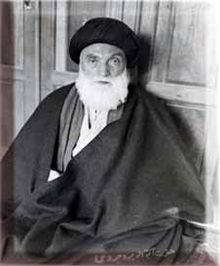ayatollah
Ayatollah ( Persian آیتالله Ayatollāh , from Arabic آية الله Ayat Allah , signs of God ') is the most importantreligious titleofzwölferschiitischen Islam.
origin
The emergence of the honorary title Ayatollah , an Islamic legal scholar , is justified directly with the reference to the Koran : "a sign of God". It was first awarded to al-Hasan ibn Yusuf ibn Ali ibn al-Muchtar al-Hilli (1250-1325), called "the highly learned" (al-ʿAllāma) . At the beginning of theological contest between seminars in Qom ( Feizie ) and Najaf in the 1930s should in modern times Abdulkarim Haeri Yazdi have been re-named with the title Ayatollah first. In the period after the Second World War , the title found greater circulation in the wake of the Islamic Revival .
Training and powers
As a rule, an ayatollah has completed decades of theological studies at a Shiite university and is in the reputation of the Shiite clergy above a hodschatoleslam , which is entitled to independent legal determination ( ijtihad ) due to its training . There is no binding procedure or a fixed training path. One becomes ayatollah through the recognition of other ayatollahs, i.e. through the habitual designation as such. Like a Hodschatoleslam, an Ayatollah is authorized to perform ijtihad and can issue legal opinions ( fatwas ).
Number and funding
The title is only given by Shiites . Sunnis do not use the title of Ayatollah because the Sunni clergy are far less institutionalized. Buchta describes 5000 holders of this title in Iran in 2004, 80 of them in official state offices. Particularly recognized Ayatollah are called Grand Ayatollah ; for their followers they are the unquestioned "source of imitation" ( mardschaʿ-e Taghlid ) . The highest level, a generally recognized mardschaʾ-e taqlid , was last held by the Grand Ayatollah Hossein Borudscherdi , who died in 1961 .
In addition to the three functions (teaching, advice on religious questions, ceremony), the believers expect the ayatollah to maintain the mosque, finance the schools and other institutions, which are covered by direct donations to him - in contrast to Sunni Islam, where the clergy is largely financed by the state. The amount of donations varies extremely depending on the Ayatollah, which depends solely on the size of the following. Ruhollah Khomeini is said to have received donations of $ 25 million in 1978.
Political Ayatollah
In January 1970, Ayatollah Ruhollah Khomeini gave a series of lectures in Najaf , which was published as a brochure under the title The Islamic State . In it, he opposed the predominant quietist stance of the Shiite clergy on political issues, especially that of his teacher Grand Ayatollah Borudscherdi, and created a justification for the constitution of the Islamic Republic of Iran, in which the most recognized Ayatollah exercises political rule on behalf of the hidden imam . Khomeini's views tried to amalgamate Shiite Islam and the political system (“rule of the clergy”: Velayat-e Faqih ), which was tailored to his own person after the Iranian Revolution.
In connection with the appointment of the religious leader of Iran Ali Khamenei as ayatollah, which was only reluctantly accepted among the ayatollahs - especially the Ghomer - leading ayatollah and the political calculation of the appointment of Ruhollah Khomeini as ayatollah in order to obtain his release from prison under the Shah, the Title name ( Ayatollah , Grand Ayatollah , mardscha'-e Taghlid ) political views read.
See also
- Kasem Shariatmadari
- Sharia (Islamic Law)
- mullah
literature
- Wilfried Buchta: Shiites . Hugendubel, Munich et al. 2004, ISBN 3-7205-2491-4 , ( Diederichs Kompakt ).
- Heinz Halm : The Schia . Scientific Book Society, Darmstadt 1988, ISBN 3-534-03136-9 .
Web links
- Ayatollah . In: Ehsan Yarshater (Ed.): Encyclopædia Iranica (English, including references)
swell
- ↑ a b c Ayatollah . In: Ehsan Yarshater (Ed.): Encyclopædia Iranica (English, including references)
- ↑ cf. Koran sura 41 , verse 53: "We will let them [...] see our signs in the wide world and in them themselves." Translation according to Rudi Paret
- ↑ Wilfried Buchta: Shiites. 2004.
- ↑ Le Monde , from 3/4. December 1978.
- ↑ Ruhollah Chomeini: The Islamic State (= Islamkundliche materials . Vol. 9). Translated from Persian by Nader Hassan and Ilse Itscherenska. Schwarz, Berlin 1983, ISBN 3-922968-21-X .
